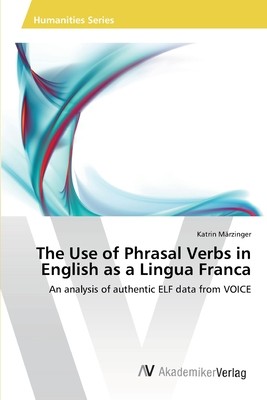
- We will send in 10–14 business days.
- Author: Katrin Märzinger
- Publisher: AV Akademikerverlag
- Year: 2013
- Pages: 220
- ISBN-10: 3639464249
- ISBN-13: 9783639464245
- Format: 15.2 x 22.9 x 1.3 cm, softcover
- Language: English
- SAVE -10% with code: EXTRA
The Use of Phrasal Verbs in English as a Lingua Franca (e-book) (used book) | bookbook.eu
Reviews
Description
This book offers a study of the use of phrasal verbs in English as a lingua franca (ELF). It gives insights into how ELF speakers use specific phrasal verbs based on an empirical study in the VOICE corpus. The study reveals that most of the phrasal verbs analyzed in VOICE seem to be used in a 'conventional' way. However, there are several instances of phrasal verb use that seem to be different to an ENL use for a variety of reasons. The analysis of these utterances indicates that although ELF speakers sometimes seem to use phrasal verbs differently than ENL speakers, and that some instances of phrasal verb use may even be considered 'incorrect' in terms of ENL standards, a 'non-conventional' phrasal verb use does not seem to affect the conversations. Moreover, the interactions suggest that the phrasal verb use in VOICE sometimes seems to be based on the 'open-choice principle' rather than the 'idiom principle'. The findings are exemplified by reference to corpus extracts. The analysis of the utterances scrutinized for this study indicates that some claims about the phrasal verb use of native speakers do not seem to hold with regard to the use of phrasal verbs by ELF speakers.
EXTRA 10 % discount with code: EXTRA
The promotion ends in 20d.21:38:07
The discount code is valid when purchasing from 10 €. Discounts do not stack.
- Author: Katrin Märzinger
- Publisher: AV Akademikerverlag
- Year: 2013
- Pages: 220
- ISBN-10: 3639464249
- ISBN-13: 9783639464245
- Format: 15.2 x 22.9 x 1.3 cm, softcover
- Language: English English
This book offers a study of the use of phrasal verbs in English as a lingua franca (ELF). It gives insights into how ELF speakers use specific phrasal verbs based on an empirical study in the VOICE corpus. The study reveals that most of the phrasal verbs analyzed in VOICE seem to be used in a 'conventional' way. However, there are several instances of phrasal verb use that seem to be different to an ENL use for a variety of reasons. The analysis of these utterances indicates that although ELF speakers sometimes seem to use phrasal verbs differently than ENL speakers, and that some instances of phrasal verb use may even be considered 'incorrect' in terms of ENL standards, a 'non-conventional' phrasal verb use does not seem to affect the conversations. Moreover, the interactions suggest that the phrasal verb use in VOICE sometimes seems to be based on the 'open-choice principle' rather than the 'idiom principle'. The findings are exemplified by reference to corpus extracts. The analysis of the utterances scrutinized for this study indicates that some claims about the phrasal verb use of native speakers do not seem to hold with regard to the use of phrasal verbs by ELF speakers.


Reviews